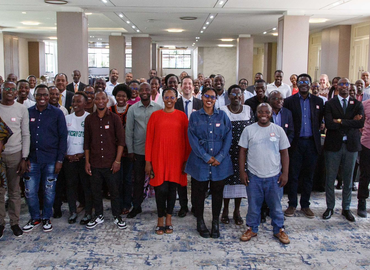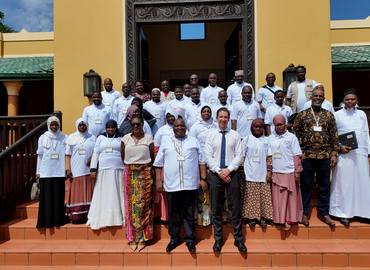400 KAICIID-supported Journalists Promote Peace in CAR

For over 15 years, Albert Mbaya has reported on peace and security in his home country of the Central African Republic (CAR), which has faced decades of turmoil and armed group opposition.
Despite Feb. 6 marking the fourth anniversary of the country’s historic peace agreement, local journalists face ongoing safety threats. Providing reliable reporting has been a challenge in a country that ranks in the bottom half of the press freedom index due to the pressures of poverty, civil war and internal and external influence.
Yet, Mbaya, along with a large swathe of CAR’s journalists, is pushing back through the KAICIID-supported Network of Conflict Sensitive Journalists, committing to ethical and factual rigor, and countering incitement to violence and divisive rhetoric with constructive reporting and calls for unity.
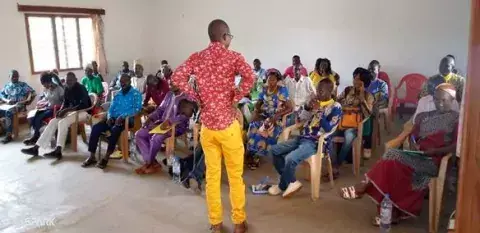
“The role of the media is that of informing and contributing to the local population’s civic education by providing real time information about threats to peace and coexistence”, said Mbaya, who is among the Network’s founding members.
Training journalists to prevent conflict
The Bangui-based Network, known by its French name Réseau des Journalistes Sensibles au conflit et de la Prévention des Messages de Haine, supports 400 local journalists by equipping them with skills to counter hate speech and promote peace.
It is supported by the UN integrated stabilization mission in CAR (MINUSCA) – part of the Department of UN Peacekeeping – and the Platform of Religious Confessions of Central Africa (PCRC) which has extensive experience in mediating peace between the country’s armed groups and elected officials.
Mbaya, who works for print and broadcast outlets, says the Network broadened his knowledge of CAR’s security context.
“We carried out several advocacy missions against hate messages spreading across different provinces. This allowed me to develop a different approach from the one I had always thought I should have”, he said.
Preventing conflict in the country by contributing to the fight against hate speech is the Network’s broader objective – part of a two-year action plan. To achieve this goal, the Network trains journalists to report objectively on conflict and avoid fueling hatred and divisions.
It also brings journalists closer to the communities they cover, helping them to report on local challenges, amplify diverse voices and build trust as promoters of peace.
Assessing security threats to journalists
This is no easy task as travelling outside the capital involves significant security concerns, especially for media representatives.
Through the Network, journalists do their best to first acknowledge and then minimise these risks.
“It is important to keep in mind that CAR has been affected by a political and military crisis for the past three decades”, Mbaye explained. “The work of the Network brings us to the field, where we are aware of the risks we face and this is why we have created contact points in over ten prefectures, ideally planning on covering the entire territory.”
Even so, journalists in the field remain exposed to security threats.
“Before departing on a mission, we take our time to assess the level of risk in the area and if we realise that it is too high, we can cancel the trip.Even so, we need to accept that we can’t predict everything and there will always be an uncontrollable risk margin”, Mbaye said.
Curbing the spread of hatred
Selda Junior Bouté, an editor at Agora News, took part in a mission to the eastern town of Baoro, where both Christian and Muslim civilians were killed by armed militia in recent years.
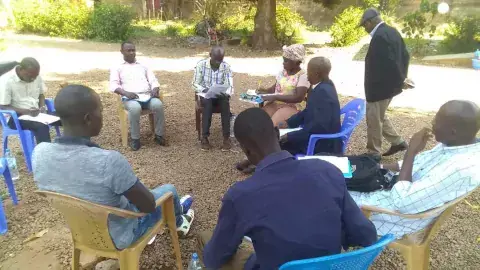
“The Network provided us with the resources we needed to travel there,” he recalled. “We could talk to the local population, witness their living conditions, and the way they are treated. This is important to understanding the overall context”.
According to Bouté, the Network’s connection to the PCRC has been crucial to address a crisis that is too often blamed on interreligious divisions rather than hate speech.
“The Network is very important and its work has really contributed to curbing hatred. It makes journalists engage in the reality of CAR’s crisis and it helps the population understand it and overcome it”.
Bouté hopes the Network can keep operating in CAR and extend its operations to new areas. “The Network has put up a good fight against hate speech by training journalists to actively listen so that if we hear false information, we can mobilise to counter it and curb the spread of hatred. There is hope that, if the Network broadens its reach, we may really get out of this situation”.
Bouté is convinced that looking at the example of other African countries which managed to overcome internal conflicts where religious and ethnic divisions were used as a propaganda tool to spread hatred, may help the Network do an even better job in CAR.
“It would be good if the Network could get the support it needs to organize research missions to countries which have already gone through such crises, such as Rwanda, the Democratic Republic of the Congo orCôte d'Ivoire ”, he said.
While remaining hopeful that better-trained media professionals can help resolve conflicts, Bouté is well aware of the challenges local journalists face. Besides security risks, limited resources make it difficult to produce high-quality news and deliver it in a timely manner.
“We work with outdated devices, our phones are not the best and the audio-visuals we produce are sometimes not very goodAt the same time, we struggle to face costs to go on assignment to remote areas, something the Network has helped with”, Bouté explained.
Engaging media in dialogue
KAICIID supports the Network as part of an effort to engage media in dialogue in conflict areas, a strategy which has so far proven effective in CAR.
“Up until a few years ago, the country’s newspapers were full of loaded language and the way information was shared really contributed to the tension”, said Pietro Siena, KAICIID Programme Manager for Africa. “This is why we decided that working to encourage conflict and religious sensitive reporting was a precondition for a successful peace engagement in the country”.
Its support to the Network of Conflict Sensitive Journalists is not the only example of KAICIID’s efforts to engage media in interreligious and intercultural dialogue in fragile contexts.
The Centre is also currently training 27 journalists from 11 countries in the Arab Region through the Dialogue Journalism Fellowship Programme.
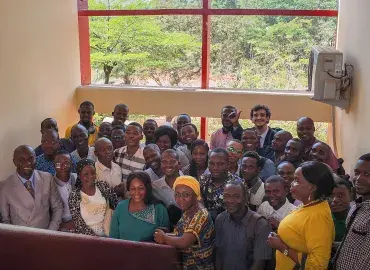
As the Sustainable Development…

